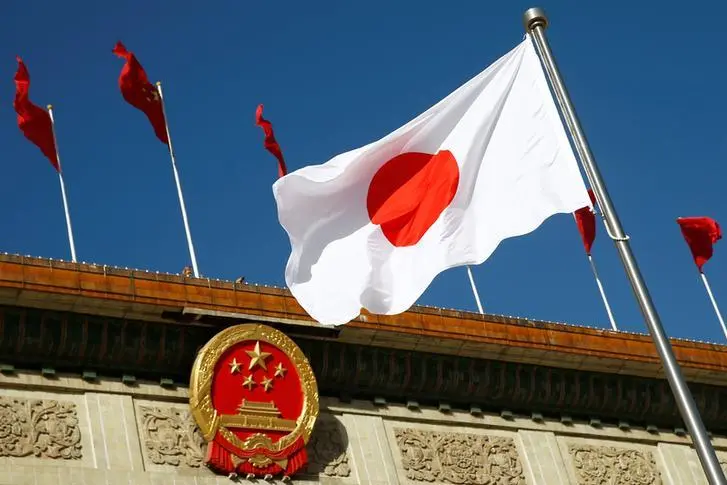PHOTO
Japan’s growing geopolitical importance will be showcased in the coming days, as the country helps convene a virtual Quadrilateral Security Dialogue (Quad) leaders’ meeting on Friday before hosting the US secretaries of state and defense on Monday.
Next week’s visit to Tokyo by US Secretary of State Antony Blinken and Secretary of Defense Lloyd Austin will be the first major overseas trip of both key Biden team officials. Their destination — where they will take part in so-called two-plus-two talks with Japanese Foreign Minister Toshimitsu Motegi and Defense Minister Nobuo Kishi — reflects growing US concerns about the challenge posed by a rising China and North Korea’s nuclear and missile programs.
China’s increasingly assertive foreign policy in the Asia-Pacific region will be top of the agenda, with the US seeking to strengthen ties with key regional allies Japan, India and Australia. Japan is at the heart of this, with the nation increasingly perceived by the Biden team as a critical bulwark against the advance of China and also Russia in the Asia-Pacific, as was the case during the Cold War.
Ahead of that dialogue, the first Quad leadership meeting between Japanese Prime Minister Yoshihide Suga, US President Joe Biden, India’s Narendra Modi and Australia’s Scott Morrison will take place. US National Security Adviser Jake Sullivan calls this four-way forum the “foundation upon which to build substantial US policy” in the region.
One of the items under discussion will be a new campaign Washington, Tokyo, Canberra and New Delhi are working on to distribute coronavirus disease vaccines in the Asia-Pacific to counter the influence of China. The White House recently held talks with other members of the Quad about this new diplomatic and security initiative.
As important as Australia and India are in the Quad, the new Biden team sees Japan as being the potential anchor of the US-led anti-China alliance in Asia. Tokyo is a longstanding member of Western clubs such as the G7 and Washington values not just the geopolitical role, but also the financial role that Tokyo can play as the world’s third-largest economy.
Beyond these structural factors driving Japanese international policy, former Prime Minister Abe Shinzo — the longest-serving premier in the nation’s history — proved personally very adept at consolidating relationships with Western leaders. He even succeeded in persuading Donald Trump that, despite his “America First” outlook, the security of Japan needed a strong US commitment as the “cornerstone of peace” in the Asia-Pacific.
This has created a significant legacy for Suga to build from and fortify Japan-US ties in the face of significant international uncertainty about a range of issues, including North Korea. Concerns about Pyongyang are rising again after a recent International Atomic Energy Agency (IAEA) report indicated the possible reprocessing of nuclear fuel for bombs in the country. US officials believe such a move could be intended as a bargaining chip for use with the Biden team to press for sanctions relief. As the administration reviews its policy toward Pyongyang, the IAEA called North Korea’s continued nuclear activity a clear violation of UN sanctions and “deeply regrettable.”
When Trump was president, Japan worried that the US may look to do a deal with Kim Jong-un, under which Pyongyang would agree to give up missiles capable of reaching the US, without eliminating its short and medium-range missiles that threaten Tokyo and other Japanese cities. This issue, however, has become less salient given the stalling of Trump’s dialogue with North Korea. Blinken has also said Biden’s approach to North Korea could involve more sanctions or other unspecified diplomatic incentives.
However, the major driver for the increasing closeness of US-Japan ties is China, covering a range of worries, including Beijing’s assertiveness around the Japanese-controlled Senkaku Islands in the East China Sea. This is why Tokyo will welcome its centrality in US foreign policy in the Biden era.
In the forthcoming meetings, both sides will reiterate their opposition to unilateral attempts to change the status quo by force or coercion in the East and South China Seas, and share their “deep concerns” over Beijing’s controversial coast guard law. This legislation, implemented on Feb. 1, allows the China Coast Guard to use weapons against foreign ships it sees as illegally entering the country’s waters, raising concerns that it could result in an escalation of maritime disputes. China Coast Guard vessels have repeatedly engaged in Japanese waters around the uninhabited Senkaku Islands, known as the Diaoyu Islands in China, in an apparent attempt to undermine Japan’s control over them.
This is why Tokyo’s importance in the Western alliance is of growing strategic importance. The Biden team believes that Japan could now become the anchor of the Quad as it seeks to double down on US alliances in the Asia-Pacific in the post-Trump era.
- Andrew Hammond is an Associate at LSE IDEAS at the London School of Economics.
Copyright: Arab News © 2021 All rights reserved. Provided by SyndiGate Media Inc. (Syndigate.info).





















